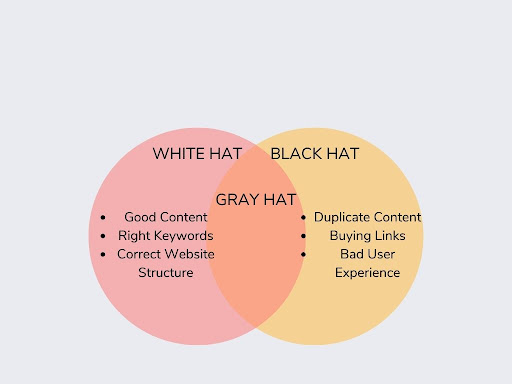What Are Bad SEO Practices Called?
June 12, 2023 •Erica Kempf

Bad SEO practices, those being used to try to “cheat” and win search engine rankings by breaking SEO best practice rules, are called black hat SEO techniques. In the not-so-distant past—and in some cases even today—it was common for people to create an SEO strategy that tried to gain visitors unethically.
These unethical SEO practices include things like keyword stuffing, buying backlinks, and spamming comment sections with their website links. Bad SEO examples like these make it harder for someone using a search engine to find the information or service they need, and it often makes user experience significantly worseAs search engine algorithms have improved, many of these black hat strategies are now penalized to make search engines function better for everyone.
In this article we’ll take a closer look at good vs bad SEO, what specific techniques to avoid, and what happens if you do them anyways.
What Is the Difference Between Good SEO and Bad SEO?
Good SEO (also called “white hat”) follows SEO industry standards and best practices. Building a strong SEO strategy using white hat techniques will take time and effort to implement, but it will ultimately lead to long-term rankings and a good user experience.
Some good SEO practices include:
- Writing high-quality content that provides accurate information
- Ensuring that your website is indexed properly
- Building a website structure that is easily crawlable by search engines
- Using appropriate and related keywords that reflect what an audience is actually searching for
- Optimizing web pages with descriptive titles, metadata, and images with alt text
Bad SEO usually violates search engines’ terms of service or negatively impacts user experience. Black hat SEO may seem like a way to quickly get the results you want, but search engines actively penalize these practices—so you could wake up any day and discover your cheating strategy landed you at the bottom of search engine results pages overnight. With recent Google algorithm changes, many of the most blatant of these black hat tactics have been exposed for the bad practices that they are.
We’ll go into more detail in the next section, but some black hat SEO practices include:
- Duplicate content
- Buying links
- Creating a bad user experience
There is another hat in the SEO game that walks the line between good and bad, and it’s called gray hat SEO. This term generally refers to an SEO strategy that uses a combination of black and white hat tactics. It can also be thought of as those techniques that follow the letter of search engine regulations but not the spirit of them—basically black hat practices that haven’t been formally recognized yet. Over the long run, gray hat SEO will almost certainly be penalized in the same way that black hat is, as search engines become even more advanced at detecting and stopping bad actions.
Some gray hat SEO practices include:
- Spinning content by taking original content from another source and rewording it just enough to evade plagiarism detection software. As duplicate content continues to be penalized and plagiarism detection advances, this will likely become a black hat practice soon.
- Using domains that have expired, either by redirecting high authority sites to your own website or by copying their content onto your own new site.
- Building blogs on content curation sites like Weebly or Blogger as backlink farms for your main website. Creating a full website you own to do this is a black hat technique, but doing it through a third-party site is technically not against regulations yet.

What Are Some Black Hat SEO Practices to Avoid?
If it feels like cheating, it probably is and you shouldn’t be doing it with your SEO. Building a website with well-written, helpful content and optimizing it by following best practices laid out by major search engines is the best and only way to achieve long term SEO success. It has the added bonus of making sure you can sleep at night.
Here’s a list of some of the worst offenders in the world of black hat SEO:
- Duplicating content, also known as plagiarizing | If you copy and paste it from another website, or even another page of your own website, its duplicate content. AI-generated content that no human touches trends dangerously close to this line.
- Buying links | Another website linking to your site shows search engines that you have something worthwhile to say. Paying another website to link to you is trying to trick the search engine into thinking your website is good. Trading links, sending people products to get links, or creating another website just to use it for links all also count as bad.
- Creating a bad user experience | A million popups, content so poorly written it’s not readable, or endlessly repeating the same few keywords all make your website worse in the keys of search engines.
What Is Keyword Stuffing, and Why Is It Bad?

One of the original black hat SEO strategies was keyword stuffing, which came in a few different flavors:
- Choosing just a few keywords you wanted to rank for, and using them in the content on a page many more times than they would naturally appear in text. For example, if you want to rank for the phrase “search engine optimization,” using that phrase 50 times in a 500-word article is keyword stuffing.
- Creating blocks of text that just repeated one or a few keywords, putting them in your website margin, and changing the text color to match the background.
- Picking a huge number of keywords, and then making your content basically nothing but a list of these keywords.
Any version of keyword stuffing makes the user experience worse, and search engines now penalize all of them.
What Are Some Consequences of Black Hat SEO Tactics?
The biggest and worst consequence of bad SEO practices is your website ranking lower on search engines. Since the entire point of these “cheats” is to get good rankings fast, they actually accomplish the polar opposite of that.
The reason they result in poorer rankings is that search engines penalize them. Search engines are in the business of helping searchers find what they are looking for online. This means Google has a vested interest in showing their users high-quality websites that deliver the information a user wants. To keep users happy, search engines create complex algorithms that reward high-quality websites by placing them higher up on search engine results (SERPS). When websites use bad SEO tactics that lure people in with tricks and then don’t deliver, search engines penalize them by tweaking their algorithms to keep these websites at the bottom of SERPS. If your rankings drop, not as many customers will be able to find you, which could mean fewer customers or revenue in the long run.
So How Do You Do Good SEO? With DemandJump!
DemandJump is built on the principles of white hat SEO practices. Our whole platform is designed around showing you what content to write to provide high-quality information to potential customers searching for it online. Learn more about how to do SEO the right way and get started for free today!
Featured Articles
Categories
- Attribution Tracking (13)
- Channel Optimization (11)
- Consumer Insights (68)
- Content Marketing (251)
- Data Science (8)
- Digital Marketing (6)
- Digital Transformation (26)
- Enterprise (10)
- Lead Generation (14)
- Market Intelligence (8)
- Marketing Analytics (39)
- Marketing Attribution (57)
- Marketing Management (153)
- Marketing Operations (86)
- Organic Search (222)
- Paid Search (52)
- Pillar-Based Marketing (63)
- Programmatic Advertising (9)
- SaaS Content (14)
- SaaS Marketing (29)
- Search Marketing (111)
- SEO Keyword Research (28)
- SEO Pillar (18)
- SEO Strategy (46)
- SMB (5)
- Website Content (12)


